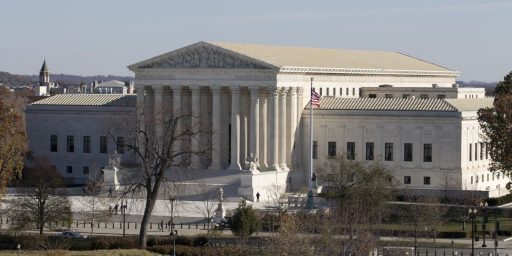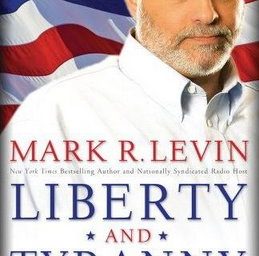YES, NEW TAXES
I’ve been meaning to mention this, but Steven Taylor has beaten me to it: Sometimes, raising taxes is just necessary. The property tax situation in California is such a case:
Buffett said he pays $14,401 in annual property taxes on his $500,000 home in Omaha, Neb., but only $2,264 on his $4 million home in Laguna Beach.
Proposition 13, which limits property tax hikes to no more than 2 percent a year, is considered politically untouchable in California.
Alabama provides another example, as the tax system is ridiculously regressive, with sales taxes in the 10 percent range in some localities to offset almost non-existent property taxes. I paid less a year in property taxes on my house in Alabama than I’ll be paying a month in Northern Virginia on a townhouse. (Although part of that’s a function of the price variation.) The sales taxes are 4.5% here, though.
Update (1348): It occurs to me that, if he’s talking present value rather than purchase price, Buffett’s $500,000 home in Omaha is almost certainly larger and nicer than his $4 million home in Laguna.
Update (1456): Justene Adamec disagrees. (With my initial point; she says nothing about the comparative housing markets in Nebraska and California.)






So just because Nebraska is over-taxed California should be as well?
Here is another thought…how about the state just spends less?
With the bunch we have in Sacramento there is no limit, other than Prop 13 and a constitutional requirement for 2/3 approval on raising taxes to limit state spending. If we gave them 98% of our income, there would still be a budget crisis in California.
This years crisis budget? Higher than last year’s.
Neal,
It’s a universal problem of government, to be sure. The main problem with Prop 13, as I understand it, is that it creates an unfair distribution of costs in that people who get in earlier are capped based on an existing appraisal of their home, forcing those who move in later to pay a relatively higher burden. This is also a generational transfer.
The check on spending is the people. I’ve got no problem with the people voting to keep taxes very low, but then they can’t expect as much from government. If the basic services–schools, roads, etc.–are suffering, it’s a problem.
The check on spending is the people…
And THAT is why there is a recall. Gray Davis has DOUBLED spending in only 5 years.
AND that is why they are holdng the line on Prop 13. If the voters do not put their foot down the posl will run wild.
Did you see what happened to Arnold’s poll number when Buffet talked higher taxes?
The problem is that if our taxes kept pace with the rise in property values, we’d have to sell our homes, since the values rise so fast that you buy a home, wait ten minutes, and it’s worth a million dollars.
Which sounds like a great problem to have until you realize there’s nowhere to move to that doesn’t also cost a million–and that you like it where you are, and don’t want to be forced out just because of property taxes.
LMA,
As one about to buy a townhouse at a price I never thought I’d pay for a “real house,” I understand what you’re saying. The problem is that, because the tax rate is fixed at the purchase/build price plus 2% per annum max increase, this means that the burden is much higher on the new folks moving in–including kids who were born and raised there but now can’t afford to buy their own place. It amounts to the kids subsidizing the middle aged, even though the latter are almost invariably better off financially.
Buffett doesn’t take into the fact the ENTIRE tax bill: property, income, sales. If he had paid income taxes in California, his calculated bill would have been MUCH higher (and don’t forget car registration and other fees we all pay out here).
As for old people getting subsidized, that’s a fact of life. Remember social security? Medicare? New drug benefit?
Good news (okay, just a fact of life) is that old people eventually die and the house will go into probate – and the tax tables – at its market value. Even if put into a trust to avoid probate, it will be recalculated at market value when put into probate.
Bottom line is that EVENTUALLY, Mr. Buffet’s house will go onto the tax role at $40,000/year (1% of $4M) which is about the average salary of a Californian.
So